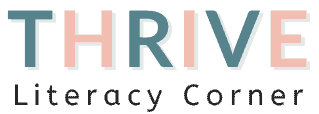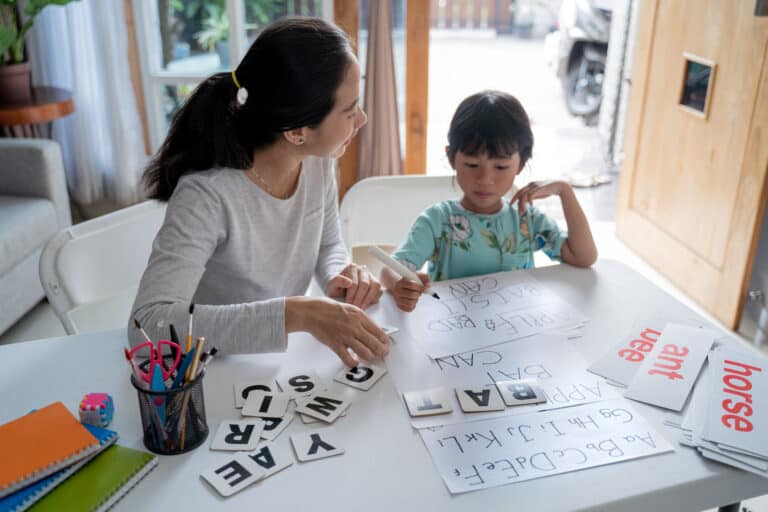How to Find the Right Reading Tutor or Dyslexia Tutor
This post may contain affiliate links, and I will earn a commission if you purchase through these links. Please read the disclosure policy for more details.
I often have clients and parents ask how they can be sure they have found the right reading tutor. There are many reading tutors, dyslexia tutors, and reading specialists to choose from with a variety of qualifications. It really will depend on what the student needs.
Join my list and get access to my vault of freebies, plus weekly emails with tips, new posts, and promotions!
*Most school spam filters block my emails, so please use a personal email.

How to find a reading tutor?
First, try calling schools and centers in your city that work with students with dyslexia or reading disabilities. These places often employ or work closely with highly qualified individuals. You can also check provider directories from the International Dyslexia Association and Orton-Gillingham.
If there are none in your city, then look online or ask for referrals from teachers. Reading tutors are often teachers, reading specialists, and other professionals with experience teaching reading. There are even some who work online, and this can be more affordable, especially if you need dyslexia tutoring.
Contact a few potential tutors, set up interviews, and continue reading to find out how to look for the right reading tutor.
What to look for in a reading tutor?
For many struggling readers who are near grade level, any teacher that works one on one focusing on reading will be sufficient.
For students who are several grade levels behind, you need to find someone who knows how to remediate the deficits. This reading tutor should assess the student, use a multisensory structured program, and regularly monitor progress. They should be able to tell you exactly what the student needs help with and know the strategies they will use to help the student. They should also use printed materials and not rely on technology, as the research shows print is more effective for struggling readers.
If the student has trouble decoding, the tutor should focus on multisensory phonemic awareness activities. If the student needs reading comprehension, they should teach visualization strategies like Lindamood-Bell’s Visualizing & Verbalizing. Spelling patterns should be explicitly taught to poor spellers as well. All activities should be multisensory.
What to look for in a dyslexia tutor?
Dyslexia tutors need to have more specific training in how students learn how to read and the specific strategies that work for struggling readers.
Often, they will have training in one of the following methods: Orton-Gillingham, Barton, Lindamood-Bell, and Wilson. Any of these would be ideal as they all work well for students with dyslexia.
Most of these programs just require you to attend training but there are no certifications. This means the dyslexia tutor attended a workshop where they learned how to use the program. Training is usually several days or longer.
Certification is more rigorous and costly. Orton-Gillingham offers different levels of certification which require supervision and experience. It also costs several thousand dollars so some cannot afford it. This is considered the gold standard for dyslexia training so many parents look for it but due to the cost and time commitment, it can be difficult to find certified tutors.
I myself have attended training for Lindamood-Bell and Orton-Gillingham. In my opinion, that is enough to properly tutor dyslexic students and struggling readers. The training teaches you exactly what to do step by step, offers ample practice, and provides materials. There is also some theory to help understand why and when to use certain methods and why these programs work for well for struggling readers.
You definitely need a tutor with experience with dyslexia and not just a reading specialist. The majority of teachers and specialists from the school system do not receive training in regards to dyslexia and don’t know how to teach these students how to read.
Related video: Reading tip – Limit screen time
Questions to ask when interviewing a potential reading tutor:
- What experience do you have with struggling readers?
- Do you have any specific training to remediate reading gaps?
- What methods do you use to teach phonics?
- What methods do you use to teach reading comprehension?
- How do you incorporate multisensory instruction into your methods?
- What programs and materials do you use?
- Will you complete a baseline assessment to determine the student’s strengths and weaknesses and formulate a learning plan?
- Will you provide feedback on sessions?
- How will you monitor progress?
- What is your approach if you notice minimal improvement?
For dyslexia tutors also ask:
- What experience do you have with dyslexia and reading disabilities?
- Do you have any training or certification for multisensory programs recommended by dyslexia advocates?
- Will you be using a research-backed program for students with dyslexia?

If you are interested in getting trained in dyslexia methods, check out the programs section of this post on dyslexia interventions and programs. As a parent, you can receive most of these training sessions and tutor your own child.
If you’re looking for more tips for struggling readers, check out these other posts:
- Effective Dyslexia Interventions & Programs
- Multisensory Spelling Strategy
- Reading Strategies for Struggling Readers – Elkonin Boxes
- Multisensory Strategies for B & D Reversals
- Systematic Synthetic Phonics for Struggling Readers
- How to Implement Multisensory Learning
- Phonemic Awareness Strategies & Activities for Struggling Readers
Join my list and get access to my vault of freebies, plus weekly emails with tips, new posts, and promotions!
*Most school spam filters block my emails, so please use a personal email.

Want to remember this? Save How to Find the Right Reading Tutor or Dyslexia Tutor to your favorite Pinterest board!








